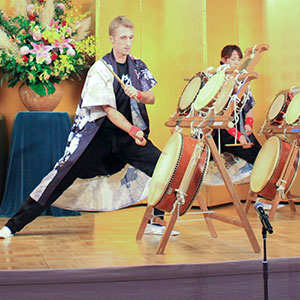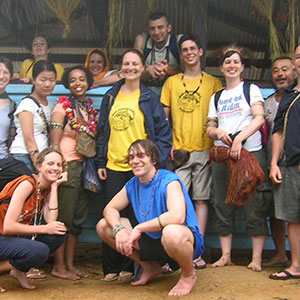Giving back: changing participants and communities
Now in its 27th year, the Japan Exchange and Teaching (JET) Programme has welcomed over 55,000 people from 62 countries to deliver grassroots international exchange between Japan and other nations. Third in our series, this column features former JETs, both in the UK and Japan, who keep the idea of fostering mutual understanding firmly at heart.
I first came to Japan as an 18-year-old backpacker. I had always wanted to live abroad at some point in my life, and by the end of my undergraduate degree this idea had solidified into a desire to live in Japan, which led me to accept a position on the Japan Exchange and Teaching (JET) Programme.
I served as an assistant language teacher in Fukui City, Fukui Prefecture, from 2006 until 2011. After three years teaching largely in a junior high school, I transferred to an elementary school position for my final two years, in order to experience a different working environment and develop new skills.
During my second year I came to learn of a local child welfare institution. In Japan, these institutions house the vast majority of children in alternative care. The children often have been abused or neglected, which can lead to problematic behaviour in the classroom.
I set up a volunteer programme of monthly visits to the home, taking around 30 JET programme participants and their friends. By volunteering our friendship, we sought to help the children rebuild trusting relationships through one-on-one time with volunteers and other children over a sustained period.
Having replicated this volunteer visit in the south, and then north of Fukui Prefecture, we realised that others could do the same across the country.
So, along with a few friends, I set up the non-profit organisation Smile Kids Japan in 2008 to raise awareness of the need for volunteering, and help people to set up sustainable volunteering projects in their communities. The organisation has since helped people set up such initiatives in over 25 prefectures.
We received a great deal of support in spreading our message from the Association for Japan Exchange and Teaching National Council—an independent, volunteer organisation that supports JET programme participants and is operated by current JET participants to report on, and assist with, the future development of the programme.
We initially centred on JET participants to ensure the visits were sustainable, and not a disruptive influence on lives that had already faced great turbulence. Media coverage in The Japan Times and regional newspapers further spread our message.
In the wake of the Great East Japan Earthquake and tsunami we started to receive offers of funding from individuals and firms.
As we had never worked with money prior to this point, we approached Living Dreams, a registered non-profit organisation who had focused until that point on working to support 33 child welfare institutions in the Tokyo area. Together we set up the joint initiative, Smiles & Dreams: Tohoku Kids Project.
This development saw me leaving the JET Programme and moving to Sendai City, Miyagi Prefecture, to become a director of Living Dreams. I helped develop their work and rolled the project out throughout Iwate, Miyagi and Fukushima Prefectures.
We focused on working with institutions, speaking to the heads directly to ascertain their specific needs.
I spoke at TEDxTokyo, a conference for innovators, and was featured on ITV’s Tonight Programme, on UK television. I helped to raise around ¥93mn (over ¥10mn of which came from JET alumni) to work with these institutions.
Following this work, I returned to the UK to read a Masters degree in modern Japanese studies at the University of Oxford, focusing on educational opportunities for children in welfare institutions.
During this time I was fortunate to be invited, along with other Brits who had contributed to relief efforts, to a small reception with the Emperor and Empress of Japan at the Japanese Embassy, London.
In 2013 I was awarded a full scholarship from the UK’s Economic and Social Research Council for a Masters and DPhil in social policy, also at the University of Oxford. My second masters compared institutional stability of Japan and Israel, and my DPhil is focusing on regional variation in how alternative care is provided in Japan.
I am currently in Japan for a year on fieldwork, working at various child guidance centres.
Until I was 28 years old I had no calling to a particular vocation. I always sought opportunities that would give me scope for personal growth and wherein I could be happy.
The JET Programme gave me both these things, and allowed me to open doors I hadn’t even known existed. It led me to something I now care deeply about, gave me a second language, and a second jikka, a place to call home.





